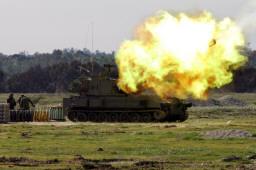Italian President Giorgio Napolitano on Monday expressed his hope that peace missions by the European Union and French President Nicolas Sarkozy would lead to an immediate ceasefire in Gaza.
''The situation is a very difficult one. Despite all the appeals being made nothing appears to be efficient from a political and diplomatic point of view,'' the head of state observed.
''Europe is trying to do something but it is not easy. It is my hope that that the EU missions coordinated by (the EU's High Representative for Foreign and Security Policy Javier) Solana and Sarkozy will be successful in achieving a truce and that a suspension of hostilities will open the way for peace,'' Napolitano said.
Looking at the overall picture, the Italian president observed that ''the situation in Gaza is marked by the presence of a force like Hamas which has divided the Palestinian people''.
''This was apparent to me when I visited there a few months ago. Hamas has aggravated an already complicated crisis,'' he added.
In regards to Italy's position, the president said he did not see ''any great difference of opinion between the leading political parties on the crisis in Gaza''.
''There is common ground between all political parties on Israel's right to defend itself and for the Palestinians to have their own sovereign state,'' Napolitano said.
Italian Foreign Minister Franco Frattini has also called for a ceasefire in Gaza but put the blame for the current crisis on Hamas.
Hamas, he explained ''not only violated a truce, it also violated the principle of land for peace''.
The minister added that while Israel ''has the right to defend itself'' from missile attacks on its border towns, ''it also has the duty to avoid civilian casualties''.
According to Frattini, ''the Palestinian people are the real victims of Hamas, which holds them hostage in Gaza''.
Frattini was critical of the EU sending two missions to the Mideast - one headed by the Czech Republic which holds the EU rotating presidency and the other by Sarkozy - on the grounds that Europe's credibility and political clout was undermined by not speaking in a single voice.
However, he recognised that France, which held the EU presidency in the second half of 2008, ''worked hard on this problem and is interested in finding a solution''.
Frattini ruled out making any visit to the Mideast himself because ''missions like these need to take place when they are useful. I will go there when the time is right''.
Italy this year holds the presidency of the Group of Eight (G8) most industrialised countries and has made the Mideast one of the priorities of its term.










